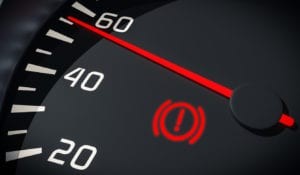Seeing a light pop up on your car’s dashboard can be unsettling, whether it’s the check engine light, the oil pressure warning, or especially the brake light. It’s your car’s way of saying something needs attention, and when that “something” is related to your brakes, it’s natural to feel concerned. Does a brake light mean your brakes are about to fail completely? Probably not, but it’s definitely a signal that it’s time to investigate. Let’s explore the common reasons why your brake light might be on and what you should do about it.
To understand why the brake light illuminates, it’s helpful to know a little about how your car’s braking system works. When you press the brake pedal, you initiate a process that uses hydraulic force to stop your vehicle. This force starts with brake fluid, which transmits pressure through brake lines to the brakes at each wheel. Think of it like this: pressing the brake pedal creates force, and brake fluid multiplies and transfers that force to slow down your multi-ton vehicle. This system uses friction and resistance, converting the kinetic energy of your moving car into heat energy through hydraulic pressure. The brake fluid pushes brake pads or shoes against rotors or drums, creating the friction needed to stop or slow your car.
Brakes are undeniably critical for your safety. So, Why Is The Brake Light On In My Car while you’re driving? Generally, the brake light is a signal from your car indicating one of several potential issues. These typically fall into a few categories: low brake fluid, an engaged parking brake, problems with the Anti-lock Braking System (ABS), or sensor malfunctions.
 Brake warning light illuminated on a car dashboard, indicating a potential issue with the vehicle's braking system requiring inspection. Why is the brake light on in my car?
Brake warning light illuminated on a car dashboard, indicating a potential issue with the vehicle's braking system requiring inspection. Why is the brake light on in my car?
Let’s break down each of these common causes:
Common Reasons for the Brake Light
Low Brake Fluid: Your brake system relies on a specific level of brake fluid to function correctly. The master cylinder, a key component of your brake system, contains a sensor that monitors the brake fluid level. If this level drops below a certain threshold, the sensor triggers the brake light. A decrease in brake fluid can indicate a leak in the system, which needs immediate attention to ensure your brakes function reliably.
Parking Brake Engaged: It might seem obvious, but a surprisingly common reason for the brake light to come on is a partially or fully engaged parking brake. Modern vehicles are equipped with sensors to detect if the parking brake is engaged, even slightly. If the sensor detects engagement while driving, it will activate the brake light, often accompanied by an audible warning. Driving with the parking brake on, even for a short distance, can cause significant damage. It can lead to overheating of the brakes, damage to brake fluid, and premature wear of brake pads or shoes, ultimately requiring costly repairs. Always ensure the parking brake is fully disengaged before driving.
ABS (Anti-lock Braking System) Malfunction: Your car’s ABS is a crucial safety system designed to prevent wheel lock-up during hard braking, especially on slippery surfaces. Issues within the ABS can also trigger the brake light, even if your car has a separate ABS warning light. If you’ve checked your brake fluid and confirmed the parking brake is disengaged, an ABS problem could be the culprit. Diagnosing ABS issues often requires professional equipment to read diagnostic codes from the vehicle’s computer system to pinpoint the exact problem and perform the necessary repairs.
Defective Sensors: Like any electronic component, sensors in your car’s brake system can fail. Sensors monitoring brake fluid level in the master cylinder or the parking brake engagement can sometimes malfunction, causing the brake light to illuminate even when there isn’t an actual issue with fluid level or the parking brake. A qualified brake technician can accurately diagnose sensor failures and replace the faulty sensor, resolving the brake light issue.
What To Do When Your Brake Light Comes On
If the brake light illuminates while you are driving, it’s important to react calmly and safely. First, find a safe place to pull over to the side of the road and stop your vehicle. Turn off the engine and take a moment to assess the situation.
After a few minutes, carefully check your brake fluid reservoir, usually located under the hood. If the fluid level appears low, you can try adding brake fluid to bring it up to the recommended level. Restart your car and check if the brake light has turned off. If the light goes off after topping off the fluid, you might be able to carefully proceed to your destination or a service station. However, it’s crucial to have your brake system inspected for leaks as soon as possible.
If the brake fluid level is normal, or if the brake light remains on even after topping off the fluid, it’s a sign of a potentially more serious issue. In this situation, it’s best to avoid driving the vehicle further. For your safety, arrange for your car to be towed to a trusted auto service center or brake specialist for a professional diagnosis and repair.
Your brakes are paramount to your safety on the road. Any indication of brake trouble, signaled by the brake light, should be taken seriously. Seeking prompt assistance from a qualified automotive professional is the best course of action. A certified technician can thoroughly inspect your brake system, accurately identify the cause of the brake light, and recommend the most effective repair solutions. Consider scheduling a brake inspection to ensure your brakes are in optimal condition, providing you with safety and peace of mind on every drive.

